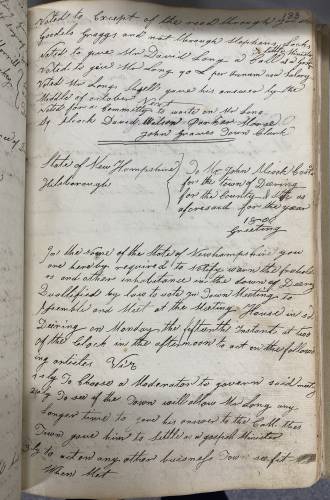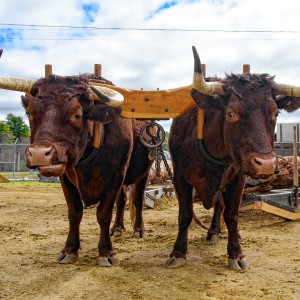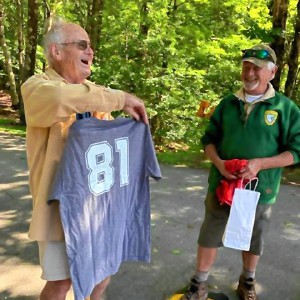From the archives: Town meeting day — a New England tradition

A picture from the Deering town records, depicting a warning for the March 15, 1800 town meeting. Courtesy
| Published: 03-02-2024 8:00 AM |
Ashley Miller shares this month’s story with ConcordTV. Watch the episode on YouTube.
Every March, citizens from towns throughout New Hampshire gather for Town Meeting day. They discuss issues, raise warrants, and some even eat cake.
The practice of holding town meetings originated in the 1630s, with voting men gathering to divvy up land. The first town meeting was actually in Dorchester, Massachusetts in 1633. New Hampshire’s town meetings started shortly thereafter, always falling in March as it was an ideal time for agrarian society, as farmers could not yet begin sowing for the season.
Land boundaries were established, disputes arising from loose animals destroying gardens and fields were settled, and election cake was consumed. Towns also approved of the taverns kept within their limits, highways and bridges were approved for laying and repair, and school districts were established.
There were also less conventional issues discussed. In 1802, the town of Bow voted to “give one shilling a head for crows killed in the town” and “voted to give any of the inhabitants of Bow three dollars a head for grey wildcats killed in said town or followed from said town to any other town and killed.” Many towns, including Durham, voted to provide those serving in the War of 1812 a “sum the town will give per month, in addition to the sum appropriated by the government of the United States, to each and every man in the militia who shall volunteer, be drafted, or required by government to go into the service of the United States, for any term of time not exceeding six months.”
While all towns had and still have town moderators, several towns had other interesting roles, such as hog reeve (someone to keep the town’s swine under control) or pound keeper (someone to watch over the enclosure where loose animals were kept).
Some roles, such as tithingman, a man voted on by the town to police the townspeople on Sundays who were supposed to be in church, and to keep order in church during long services to dissuade unruly children or folks nodding off. To assist him, many tithingmen were provided a long staff, with one end that was sharp or hard and the other equipped with something soft such as a deer tail or rabbit’s foot. When someone dozed off, they might receive a tickle with the soft end or a poke from the sharp side to wake them.
Today, many of these roles are more ceremonial in nature, with towns often electing newcomers and newlyweds to such posts. In the 1950s, in Cornish, J.D. Salinger and his second wife, Claire were appointed hog reeves. When former Governor John Sununu and his wife Nancy moved to Hampton Falls in 2007, they were bestowed with the honor.
Article continues after...
Yesterday's Most Read Articles
The tradition of town meeting day endures. Folks all around New England will gather this month to raise local issues pertinent to their daily lives, engage in their civic duty, and build community.


 Celebrate agriculture, education, and community at the NH Farm, Forest, and Garden Expo
Celebrate agriculture, education, and community at the NH Farm, Forest, and Garden Expo Community Players of Concord present newest adaptation of Pride and Prejudice
Community Players of Concord present newest adaptation of Pride and Prejudice Concord Monitor editor Mike Pride’s final book explores the lives, works of Northern New England poets
Concord Monitor editor Mike Pride’s final book explores the lives, works of Northern New England poets Active Aging: John Burke of Peterborough celebrated his 81st birthday with 81 hikes up Pack Monadnock
Active Aging: John Burke of Peterborough celebrated his 81st birthday with 81 hikes up Pack Monadnock
